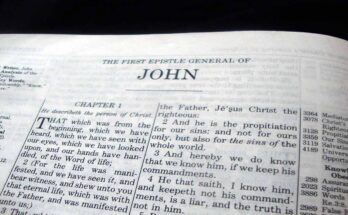The Epistle to Philemon
One of three personal letters in the Bible, the letter to Philemon is Paul’s personal plea for a slave. Onesimus “belonged” to Philemon, a member of the Colossian church and Paul’s friend. But Onesimus, the slave, had stolen from his master and run away. He ran to Rome where he met Paul, and there he responded to the Good News and came to faith in Christ. So Paul writes to Philemon and reintroduces Onesimus to him, explaining that he is sending him back, not just as a slave but as a brother.
Paul pleads on behalf of Onesimus, a runaway slave; Paul’s intercession for him illustrates what Christ has done for us. As Paul interceded for a slave, so Christ intercedes for us, slaves to sin. As Onesimus was reconciled to Philemon, so we are reconciled to God through Christ. As Paul offered to pay the debts of a slave, so Christ paid our debts of sin. Like Onesimus, we must return to god our Master and serve him.
Strong’s Concordance of the Bible
The New Strong’s Expanded Exhaustive Concordance of the Bible is a valuable tool for pastors, teachers, and students of the Bible. This expanded edition is computer generated for highest accuracy, and the Hebrew and Greek dictionaries have been augmented with definitions from the classic reference work Vine’s Complete Expository Dictionary of Old and New Testament Words.
This small letter is a masterpiece of grace and tact and a profound demonstration of the power of Christ and of true Christian fellowship in action. What barriers are in your home, neighborhood, and church? What separates you from fellow believers – race? status? wealth? education? personality? As with Philemon, God calls you to seek unity, breaking down those walls and embracing your brothers and sisters in Christ.
Writer of Philemon
Written by the Apostle Paul, “a prisoner of Jesus Christ” (Philemon 1), in the company of Timothy having been commissioned of God with an apostleship (job) in the dispensation of grace to write a book (personal letter).
Date Written
During the two years that the Apostle Paul was in his own hired house (A. D. 61-63), continuing to preach the kingdom of God (Acts 28:31). Paul wrote Philemon at about the same time he wrote Colossians.
To Whom Written
To “Philemon our dearly loved beloved, and fellow-laborer, and to our beloved Apphia, and Archipus our fellow soldier, and to the ekklesia in thy house” (Philemon 1-2). Written from Rome.
Purpose of Philemon
The purpose of the book of Philemon was to exemplify dealing with others in grace, just as God deals with us in this dispensation. To convince Philemon to forgive his runaway slave, Onesimus, and to accept him as a brother in faith.
The theme of the Philemon is the power of the gospel to transform lives (“formerly he was useless” but “now he is indeed useful,” v. 11) and to impact human relationships (receive him “no longer as a bondservant [or slave] but more than a bondservant, as a beloved brother,” v. 16).
Historical Setting of Philemon
Philemon was a resident of Colossae and a convert of Paul. Philemon’s house was large enough to serve as the meeting place for the church there. He was benevolent to other believers, and his son, Archippus evidently held a position of leadership in the church. Philemon may have had other slaves in addition to Onesimus, and he was not alone as a slave owner among the Colossian believers. Thus this letter and his response would provide guidelines for other master-slave relationships.
Theological Contribution
The epistle to Philemon is a lesson in the art of Christian relationships. No finer example of “speaking the truth in love” exists than this beautiful letter. While it was Philemon’s legal right in the ancient world to punish or even kill a runaway slave, Paul hoped – indeed expected – that Philemon would receive Onesimus back as a brother in the Lord, not as a slave.
Special Consideration in Philemon
Although Paul never, so far as we know, called for an end to slavery, the epistle to Philemon laid the ax at the root of that cruel and deformed institution – and to every way of treating individuals as property instead of persons.
Scripture Study Resources
ESV Study Bible – Study Bibles give you a deeper understanding of God’s Word with tools for life application like commentary, maps, charts, concordance, and study notes. Search our popular translations- NIV, ESV, NKJV, KJV and more!
Believer’s Bible Commentary: Second Edition – A Bible commentary is a written, systematic series of explanations and interpretations of Scripture. Commentaries often analyze or expound on individual books of the Bible, chapter by chapter and verse by verse. Some commentary works provide analysis of the whole of Scripture.
The New Strong’s Expanded Exhaustive Concordance of the Bible – The best concordance for word study! This exclusive new edition of a legendary classic puts generations of biblical research at your fingertips. A valuable tool for pastors, teachers, and students of the Bible.
Vine’s Complete Expository Dictionary of Old and New Testament Words – This classic word study resource allows you to study the meaning of biblical words in the original languages without spending years learning Greek or Hebrew. A great resource for students, seasoned pastors, and anyone who enjoys biblical word studies–even if they have little to no formal training in Hebrew or Greek.
Halley’s Bible Handbook – The beloved and classic Bible companion has been thoroughly updated, while retaining its time-honored features and Dr. Halley’s highly personal style, to offer even greater clarity, insight, and usefulness.
Click here to print or download the scripture outline “Philemon: Dearly Beloved, Fellow Laborer“





